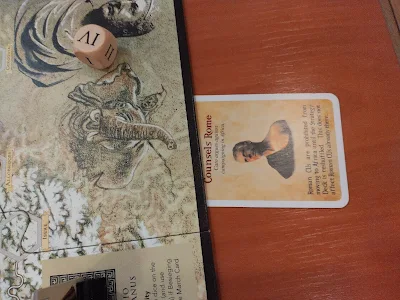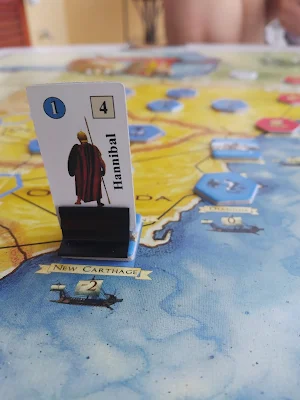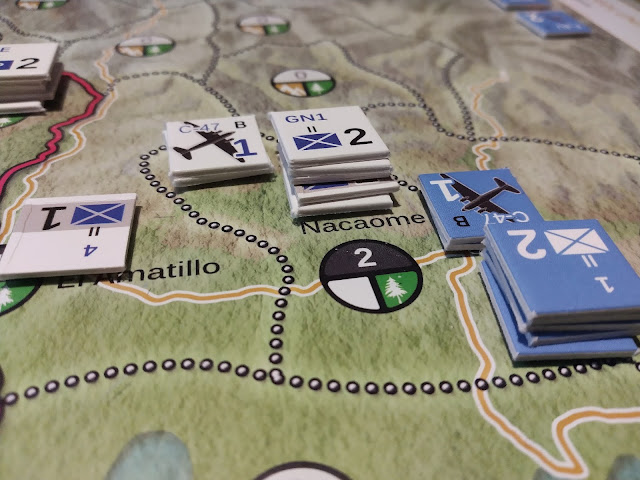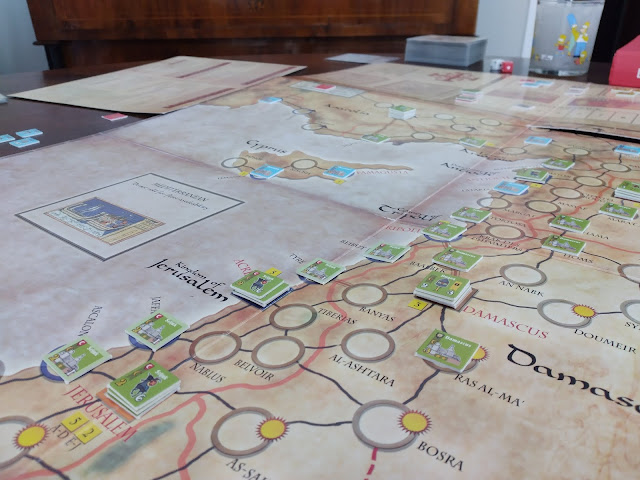Hannibal. Affinities-differences between Senator Cato and us
Carthaginian: Alex Isabelle
Roman: Laura Beltrami
What will be remembered as one of the most particular Hannibal games I've ever played opens with a tired advance from Hannibal. While the citizens of Massalia, loyal to Rome, broaden their control over the neighboring territories, the Insubrians and the Boii of Gallia Cisalpinia do the same, involving in their league the Taurini, who inhabit the more western lands of the Po Valley.
 |
| The state in which Laura was at the end of the review of the rules. Scenario: Livorno-Olbia ferry. |
This is obviously a problem for the Romans, because it risks offering the Carthaginians considerable tactical support. Hannibal, in fact, begins at this point to march towards Cisalpinia. The Roman consuls, who in this phase are Tiberius Sempronius Longus and Publius Cornelius Scipio, father of the homonymous Scipio whom real history will remember as Africanus, "the African", are nevertheless men of thought rather than fatigue. They do not immediately take up arms against Hannibal, preferring to dedicate themselves to the eradication of the Bruttians from modern-day Calabria, in the first case, and to the worldly life of Rome, in the second. The Carthaginian leader, accompanied by his second in command Hasdrubal Gisgo - who from here on we'll simply call Gisgo to avoid confusion with the other Hasdrubal - therefore crosses the Alps without encountering military resistance. Not by the Romans, at least: first the transalpine Gauls, autonomous, and then the Alps themselves, ask a heavy duty to the Carthaginian forces, which when they reach their Cisalpine allies are reduced to a half compared to a year earlier. The elephants, however, survive, as well as the catapult that the Carthaginians built along the way and which, they perjure, will be essential to checkmate Rome.
Having learned of the Carthaginian advance, the Romans wake up and elect two new consuls: Gaius Claudius Nero, who will take under his wing the troops of the now proconsul Tiberius Sempronius Longus and conclude the pacification of the Bruttians in Southern Italy, and Marcus Claudius Marcellus, a man of action, already a war hero having personally eliminated the Gauls' king Viridomarus and for having led the infamous siege of Syracuse in which Archimedes met untimely death, despite special arrangements were issued on this regard. Marcellus feels he can offer a good challenge in the Second Punic War as well; with a large army under his control, he proceeds north, parking in Falerii. Hannibal, who has recruited some barbarians along the way in order to replace his fallen soldiers, has just conquered Ariminum. He decides to force his hand and face Marcellus on the battlefield. He has a strategic advantage, but Marcellus is a leader of enormous experience and manages to repel the Carthaginian forces. The Second Punic War will still be long, but here Marcellus gives a great show of strength and discipline, becoming the first Roman to resist the advance of Hannibal in Italy. A few weeks later Marcellus again clashes with him, attacking him in Ariminum. This time it is him who is defeated, in a battle that however does not leave many Romans dead on the battlefield. The situation does not take a good turn for Carthage and, since the war is still long, Hannibal opts to turn around and go back beyond the Alps. He loses a small number of men, including half of the elephants, but manages to keep the catapult.
 |
| Cato comes up with the doctrine of the appeasement. |
Some time passes and the moment comes to appoint new consuls. Marcellus is selected as the new proconsul, while Nero is retired and replaced by two new fixers: Quintus Fabius Maximus and, again, Tiberius Longus. They are an expression of the doctrine of prudence, advocated by Senator Cato the Censor, whose line antihistorically opposed to an invasion of Africa prevails in Roman politics (yes, we know that this does not accord with his well-known "Carthago delenda est", but anyway, the card has this effect). The first of the two consuls, together with Marcellus, goes north to try to eliminate the resistance of the Boi barbarians, the elimination of which is essential to gain control over the province, while Tiberius Longus remains in the south, hoping to get away with it and stay on vacation. Which does not happen, because Syracuse suddenly uprises, proclaiming itself faithful to Carthage. Longus is then sent to Syracuse for a siege which, due to the continuous interruptions, will last over a year.
 |
| Longus deals with the siracusan rebels. |
Meanwhile, Hannibal gathers the forces of his brother Hasdrubal and crosses the Alps for the third time, heading towards Marcellus, who is camping near nowaday's Verona. Reached the tribe of the Insubrians, Fabius Maximus intercepts him. Hannibal wins the battle, but this blocks the Carthaginian advance. The Romans operate a controlled retreat towards Central Italy.
Some time passes and a new round of elections arrives. Marcellus is selected as the new proconsul because of his successes, and substituted by a new consul, Aemilius Paulus. Marcellus takes the sea from the coast of Etruria and sets sail for Massalia. Here he disembarks, gathers his forces and proceeds south to occupy the province of Idubeda, effectively opening a new front that destabilizes the Carthaginian war effort. Hasdrubal and Mago, Hannibal's two brothers, supported by a few soldiers, but also by many barbarian allies of theirs, begin a war of attrition which, after an initial victory by Marcellus due to the defection of said barbarians, sees the Romans receive a series of hard-to-replace losses. A year later the war hero Marcellus, badly supported by his homeland, is finally ingloriously killed by Hasdrubal on the battlefield.
Meanwhile, Hannibal is blocked. After having reunified Gallia Cisalpinia, he proceeds slowly first in Samnium and then in Etruria, constantly being kept under fire by the numerous Roman troops, never really knocked down by the many battles lost in Northern Italy. In reality, more than the advance of Hannibal, what makes the Romans lose control of a couple of provinces are precisely the military defeats suffered in Iberia. Whenever the news of a crushed legion arrives, some cities rebel against the Republic, and the same happens at the news of the brave Marcellus killed in battle. The same had happened previously also to the Carthaginians, who in fact had seen their control waver both over the Iberian provinces - Idubeda itself was recovered with difficulty, after the campaign of Marcellus - and over the African ones.
It would be useful if Mago, an expert navigator, managed to bring reinforcements to Southern Italy, opening a new front capable of easing the pressure on Hannibal. But, despite all the preparations, the support of the Syracusan navy and the alliance with Philip of Macedon (all things that diminish Rome's control of the seas) Mago never manages to take to the sea. He tries four times and four times he's rejected, either by the enemy fleet, either by adverse weather, or by Neptune himself. Nevertheless, Hannibal actually manages, slowly, to reach Rome and to besiege it using the notorious catapult. Here too, however, the dice of the Gods do not play their part and this siege translates into nothing, because to respond to this state of emergency a second proconsul is summoned: Scipio Africanus.
 |
| Scipio Africanus comes in defence of Rome. |
Supported by an enormous amount of legions gathered around Southern Italy, the latter advances towards Hannibal, who must leave the siege and cautiously retreat northwards. He is reached in Ariminum; he escapes the battle, but is recovered near the Boi's tribe. Thanks to their contribution, the Carthaginian troops find the strength to resist. The two armies are perfectly balanced and play a series of mirror tactics. The confrontation becomes a battle of attrition that historians will claim to have lasted more than twenty-four hours. Maharbal, commander of the Numidian cavalry, almost manages to enclose the Roman army, which seems to be about to yield. But suddenly the last reserves loyal to Rome manage to resist the frontal attack of the Carthaginian troops. Exhausted, they surrender, beating a retreat.
This clash between the Roman and Carthaginian armies, destined to become legend for the extreme tactical level put in place as well as for the duration of the battle, leaves on the ground a very serious amount of deaths not only for the Carthaginians, who however manage to retreat neatly towards the Alps, but also for the Romans, who saw many legions eliminated. Hannibal now knows the way and in crossing the Alps he doesn't get anyone killed; however, as soon as he reached Gallia Transalpinia, he is attacked again by the local barbarians, who kill a few more soldiers before being dispersed.
 |
| Gaio Nero is sent back home and substituted by Fabius Maximus. |
The game would turn for the worst for Hannibal was it not that, in all of this pandemonium, Gallia Cisalpinia is still loyal to Carthage. So Scipio proceeds to occupy, once again, the barbarian lands, while the consul Gaius Nero, parked in the defeated Syracuse with an enormous contingent of troops, finds himself in the position to launch an invasion of Iberia. The bizarre political line of Cato, however, strikes again: from Rome comes the order to replace the proconsul. Nero is sent back to the capital; the revived, elderly, Fabius Maximus takes his place, announcing immediately that he has no intention of leaving the Italian borders. Cato applauds, Laura not so much.
Hannibal marches to New Carthage, in Iberia, and spends a year rebuilding his army. The conquest of Northern Italy by Scipio again proceeds slowly: the barbarians are extremely tenacious and do not allow themselves to be subjugated by the Roman troops, who suffer various losses, first due to useless attempts at pacification and then because of the winter attrition. Among other things, there is also an epidemic of some disease, perhaps dysentery, which inflicts many, painful losses to the troops of the Africanus. This allows the Carthaginians to attempt an extreme maneuver: Hasdrubal leaves for Italy, taking with him all the troops previously controlled by his brother, including the elephants, who know well the road through the Alps, and the catapult built years earlier, now reduced to a mere good luck charm. Hasdrubal crosses the Alps and reaches the lands of the Taurini, now subjugated by the forces of Scipio, who is still trying to "dialogue" with the Boi. Realizing that every advantage must be exploited in one's favor, because a defeat against Hasdrubal would risk translating into a massacre, especially now that he is in full Gallia Cisalpinia, he abandons the campaign against the Boi for the umpteenth time and intercepts the forces of Hasdrubal further west, near the Alps.
 |
| The exhausting battle between Hannibal and Scipio near the Boi's tribe, in the Po Valley. |
The battle is hard and is lost by the Carthaginians. Defeated, they must retreat, but behind them are the inhospitable mountainous territories of the Alps, where it is almost impossible to find shelter and perform a controlled retreat. Many of them surrender, others are brutally killed, others disperse never to be heard again. Hasdrubal is not spared. The elephants and the catapult, symbol of a Carthage that never stops dreaming, are carried in triumph by the Roman troops.
The news of the defeat spreads immediately, causing the trust of the Carthaginian colonies to collapse. These begin to rebel. Even in Africa the whole of eastern Numidia cheers for the end of Carthage and proclaims itself independent.
In Italy there is exultation as the war draws to a close. We are now in the last year of the Punic war, and the Carthaginians must try everything they can. Politically speaking, Rome is actually not much better off than Carthage and her troops are largely stationed in the south of Italy. A final counter-offensive to inflict a great wound on the Roman Republic, capable of rebalancing the chessboard, is possible. Hannibal, so, gathers a good contingent of troops and once again heads north. He crosses the Alps for the fifth time, supported by a local guide known in previous crossings. He manages to reach almost unscathed a Gallia Cisalpinia that is still in the balance between Carthaginian and Roman control. Scipio tries to intercept him in Ariminum, but Hannibal surprises him: he also surpasses the Apennines, which cost him several deaths, and reaches Etruria. At the news of Hannibal's return, the plebs of this territory, tried by a war that has been going on for about ten years, rebel against Rome, becoming independent and calling themselves out of the conflict. Scipio the African does not intend to let this affront pass: he puts himself at the head of an army still battered by the time of the problematic campaign of Gaul Cisalpinia and confronts Hannibal in Faesualae.
 |
| Hannibal prepares his last offensive. |
The strategic advantage at this point is on the side of Scipio, who however finds himself having to face a Carthaginian resistance destined to become legend: the attackers, supported by information stolen from a Roman messenger intercepted near the battlefield, prolong the battle as much as possible, trying in every way to assert their military capabilities, even in this extreme situation. One after another, the Roman and Carthaginian troops fall and disperse. The amount of dead soldiers on the battlefield seriously risks compromising the success of Scipio, who, however, cannot give up now. One dead at a time, the rear approaches the front line and the generals themselves are called upon to fight to inflict ultimate defeat on the enemy troops. The fight is reduced to an actual man-to-man combat, during which the unthinkable happens: in a fight to the death it is Scipio himself, in fact, who kills Hannibal, in the same way in which the other great general who had preceded him, Marcus Claudius Marcellus (the only one, besides him, able to stand up to the Carthaginians) had destroyed the Gallic resistance by killing the Gauls' king with his own hand. This will be the last battle of the Second Punic War; at its end, on the game board, in Faesulae's space, only the marker of the Roman proconsul remains, no longer accompanied by any legion. Scipio has triumphed, but he is alone.
This ends the war. The news of the death of Hannibal, the hero who crossed the Alps five times, immediately resounds in all the Carthaginian possessions, which largely rebel. Rome wins the Second Punic War, which may not be the last, given that Carthage was ultimately not destroyed, neither Africa invaded, nor Iberia recaptured. It is certain, however, that it will take a long time for the Carthaginians to still be able to rise to the level of the Republic, and in the meantime Rome will have plenty of time to enormously expand her power. Cato's doctrine ultimately proved successful.
(Small side note from Alex: I played Hannibal many times; it's a game I love and I have never been defeated. The fact that Laura has managed to knock me out begins to make me fear that the student may be in a position to surpass the teacher. That's no good).
Do you want to read other stories? Click here for the full list.







Comments
Post a Comment